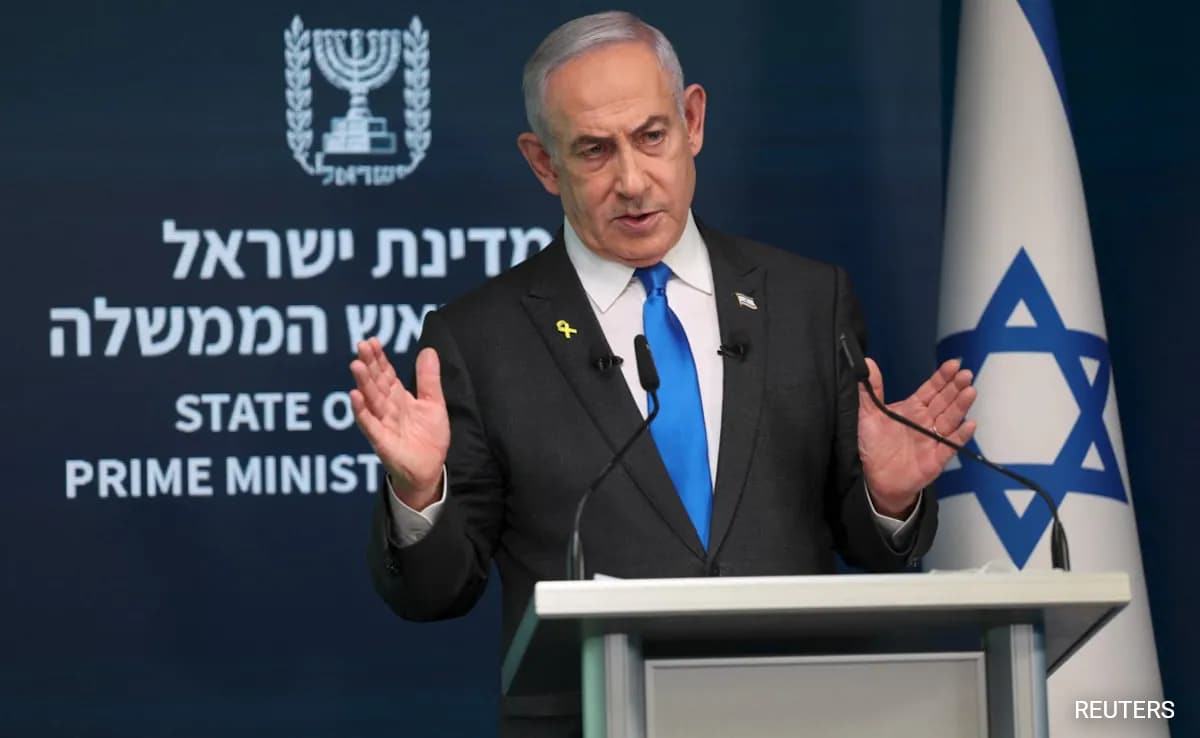
Prime Minister Benjamin Netanyahu’s office said Tuesday that Israel — and not the United States — will decide how it will retaliate after Iran fired nearly 200 missiles at his country earlier this month.
The comments came as a top Iranian commander, whose absence sparked rumors he could have been killed in an Israeli strike, appeared publicly for the first time in weeks.
There were also exchanges of fire between Israel and the Iran-backed group Hezbollah as fighting intensified in Lebanon, while humanitarian groups warned of a serious humanitarian crisis in the Gaza Strip.
On October 1, Iran fired about 200 missiles at Israel in response to an Israeli attack on the Lebanese capital Beirut, killing Hezbollah leader Hassan Nasrallah and Iranian general Abbas Nilforoushan.
Israel has vowed to respond to the attack. Biden – whose government is Israel’s top arms supplier – has warned against attacking Iran’s nuclear or oil facilities to avoid a wider war.
Netanyahu assured the White House that Israel was only considering targeting military sites, according to a Washington Post report on Monday, citing unnamed US officials.
A statement from Netanyahu’s office on Tuesday struck a different tone.
“We listen to the views of the United States, but we will make our final decisions based on our national interest,” the statement said.
Also on Tuesday, Ismail Qaani, the head of Iran’s powerful Quds Force, attended Nilforoshan’s funeral, dismissing rumors that he had been killed.
Firing between Israel and Hezbollah
Israeli forces launched several strikes in eastern Lebanon on Tuesday, a day after Netanyahu vowed to “brutally attack Hezbollah in all parts of Lebanon, including Beirut.”
Lebanon’s official National News Agency (NNA) reported that several Israeli airstrikes hit the eastern Bekaa valley, putting a hospital in the city of Baalbek out of service.
“It was a violent night in Baalbek, we haven’t seen such a night since the 2006 war between Israel and Lebanon,” resident Nidal al-Solh, 50, told AFP.
Israeli strikes have targeted Hezbollah strongholds as well as other parts of Lebanon, including a northern Christian-majority village where at least 21 people were killed on Monday, according to the health ministry.
“Our rescue operations are becoming more difficult, as the attacks never end and target us,” said Anis Abla, civil defense chief in the southern border town of Marjayoun.
At least 1,315 people have been killed in Lebanon since Israel stepped up bombing there last month, according to an AFP tally of Lebanese health ministry figures, although the actual toll is likely higher.
The war in Lebanon has displaced at least 690,000 people, according to figures verified last week by the International Organization for Migration.
UNICEF and the World Food Program on Tuesday called for more funding to meet “growing” needs in Lebanon.
‘Completely unfair’
Israel says it wants to push back Hezbollah to secure its northern border and allow thousands of people displaced by rocket attacks since last year to return home safely.
Hezbollah claimed several attacks early Tuesday, including rockets targeting Israeli troops in northern Israel.
It also said it shot down an Israeli Hermes 450 drone overnight, without disclosing where it was.
Hezbollah fighters also clashed with Israeli troops in a Lebanese border village and fired rockets toward the northern Israeli city of Kiryat Shmona, the group said.
Hezbollah says its attacks are also in support of Palestinian militants Hamas, who attacked Israel on October 7 last year, starting the ongoing war with Israel in the Gaza Strip.
Israel has faced new criticism over injuries and damage caused to UN peacekeeping force UNIFIL, which has been deployed in Lebanon since 1978 after the last Israeli invasion.
Italian Prime Minister Giorgia Meloni, whose country is the second-largest contributor of UNIFIL peacekeepers, criticized the Israeli attacks. He told the Italian Senate that the Israeli military’s attitude was “completely unjustified”.
The UN Security Council on Monday expressed “strong concern” for the first time over the injuries to peacekeepers in Lebanon.
UNIFIL has rejected Netanyahu’s request for peacekeepers to “move out of harm’s way”, with UN peacekeeping chief Jean-Pierre Lacroix saying the blue helmets will remain in place.
‘Unimaginable fear’ in Gaza!
Israel has continued bombing Gaza, where it is at war following Hamas’ attack on southern Israel, while deploying troops to Lebanon.
That attack killed 1,206 people, mostly civilians, including hostages who died in captivity, according to an AFP tally of official Israeli figures.
Israel’s retaliatory military campaign in Gaza has killed 42,344 people, most of them civilians, according to the health ministry in the Hamas-run territory. The UN has described the figures as reliable.
At a school-shelter site hit by the Israeli attack in the central Nusret camp, Fatima al-Azab said there was “no security anywhere” in Gaza.
“They are all children, sleeping in blankets, all burnt and cut,” he said.
In northern Gaza, the Israeli army announced it had effectively surrounded the Jabaliya area as it sought to defeat Hamas fighters.
The International Committee for the Red Cross warned that “Northern Gaza families are facing unimaginable fear, the loss of loved ones, confusion and exhaustion”.
“People must be able to flee to safety,” said the ICRC’s Adrian Zimmerman.
(Except for the headline, this story has not been edited by NDTV staff and is published from a syndicated feed.)





